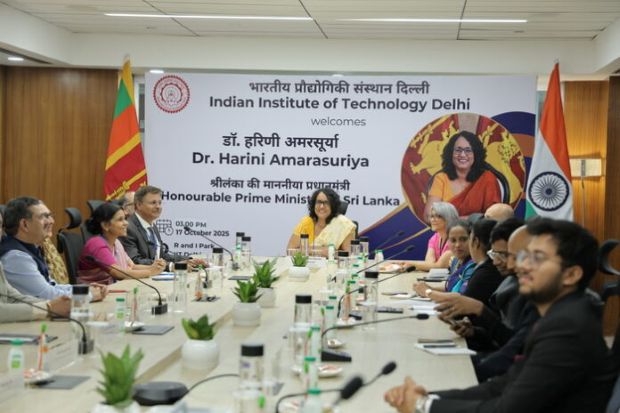Balancing Beijing’s prowess with New Delhi’s proximity
Harini Amarasuriya’s China-India shuttle diplomacy
By Rathindra Kuruwita
Sri Lankan Prime Minister Harini Amarasuriya was in China and India in quick succession, the latest demonstration by the National People’s Power (NPP) government that it is keen on balancing its two most consequential relationships.
Amarasuriya visited China first. In Beijing, she met Chinese President Xi Jinping on October 14 on the margins of the Global Leaders’ Meeting on Women. During the meeting, China pledged to keep Sri Lanka a priority in China’s neighbourhood diplomacy, and the two sides emphasized continued cooperation in the port economy, modern agriculture, the digital and green economies, tourism, and sharper law enforcement coordination against cross-border crime. Cooperation with China in these issues is vital for Sri Lanka to achieve its goals, i.e., a port economy that turns ships faster, green and digital infrastructure that narrows the import bill, and agriculture and tourism value chains where Chinese technology and financing can raise productivity. It is also not surprising that the two sides discussed law enforcement. Cracking down on cross-border fraud, cybercrime, and illicit finance is vital to an economy trying to rebuild credibility with lenders and voters. These align with the government’s drive to improve governance while enhancing infrastructure, making the country a more attractive destination for investments.
In Delhi, Amarasuriya shared the stage at the NDTV World Summit 2025 with Indian Prime Minister Narendra Modi and former British and Australian leaders Rishi Sunak and Tony Abbott; visited her alma mater, Hindu College, where the school inaugurated a new research facility named the ‘Harini Amarasuriya Social & Ethnographic Research Lab’ and posed with her friends and fellow academics.
Optics alone are not policy, but in South Asia, familiarity can lower transaction costs, and Amarasuriya’s performance signalled a comfort with India’s public square.
Prime Minister Amarasuriya’s focus in China was practical cooperation, ports, agriculture, digital and green infrastructure, tourism, and law enforcement, things Colombo needs to cut its import bill, raise productivity, and restore credibility with lenders and voters. In India, her focus was on showing that Sri Lanka was comfortable in mingling with the Indian elites and that it understood Indian sentiments.
This does not mean the Amarasuriya’s India visit has eliminated friction. Of course, there are many issues to iron out with both countries. Some of the issues with China are the direct result of Indian pressure. For example, in late 2023, Sri Lanka imposed a moratorium on foreign research vessels visiting its ports due to continuous Indian pressure against the arrival of Chinese research vessels. Sri Lankan universities depended on partnerships with China for marine research. For almost two years, Sri Lankan students have been deprived of acquiring valuable experience in an international research setting with access to cutting-edge technologies. On the other hand, thousands of Indian fishermen, who use destructive fishing techniques, poach in Sri Lankan territorial waters, depriving the country of millions of dollars and endangering the livelihood of thousands of fishermen.
The issue was discussed during Amarasuriya’s visit, but no one expects a solution anytime soon. Colombo has no effective method of stopping Indian fishermen, and New Delhi sees no reason to stop its fishermen from poaching in Sri Lankan waters. On the other hand, International Monetary Fund (IMF) conditions on Sri Lanka, especially on tax concessions, have delayed the implementation of key agreements with China. The $3.7-billion deal with Sinopec is in limbo as the country can no longer provide the tax concessions the Chinese want. Investments in the Port City have stalled due to the same reasons.
In the end, the value of Amarasuriya’s China-India shuttle diplomacy will be judged not by photo-ops but by whether it takes Sri Lanka closer to a more resilient economic and security posture. Balancing Beijing’s technology and financing with New Delhi’s proximity is not only sensible statecraft, but the only option available to Sri Lanka if it wants to develop, while protecting its sovereignty. If Colombo can convert ties with Beijing and Delhi into measurable domestic gains, faster ports, cheaper and cleaner power, stronger law enforcement, and higher-value tourism, the government could lay the foundations of a real economic recovery.
Sri Lanka cannot control the temperature between its two largest partners, but it can control its own predictability, competence, and integrity. That ultimately is how a small state like Sri Lanka can turn great-power rivalry into national benefit.
– Rathindra Kuruwita is a journalist and a researcher from Colombo, Sri Lanka, and this article was originally featured on thediplomat.com



Comments are closed, but trackbacks and pingbacks are open.